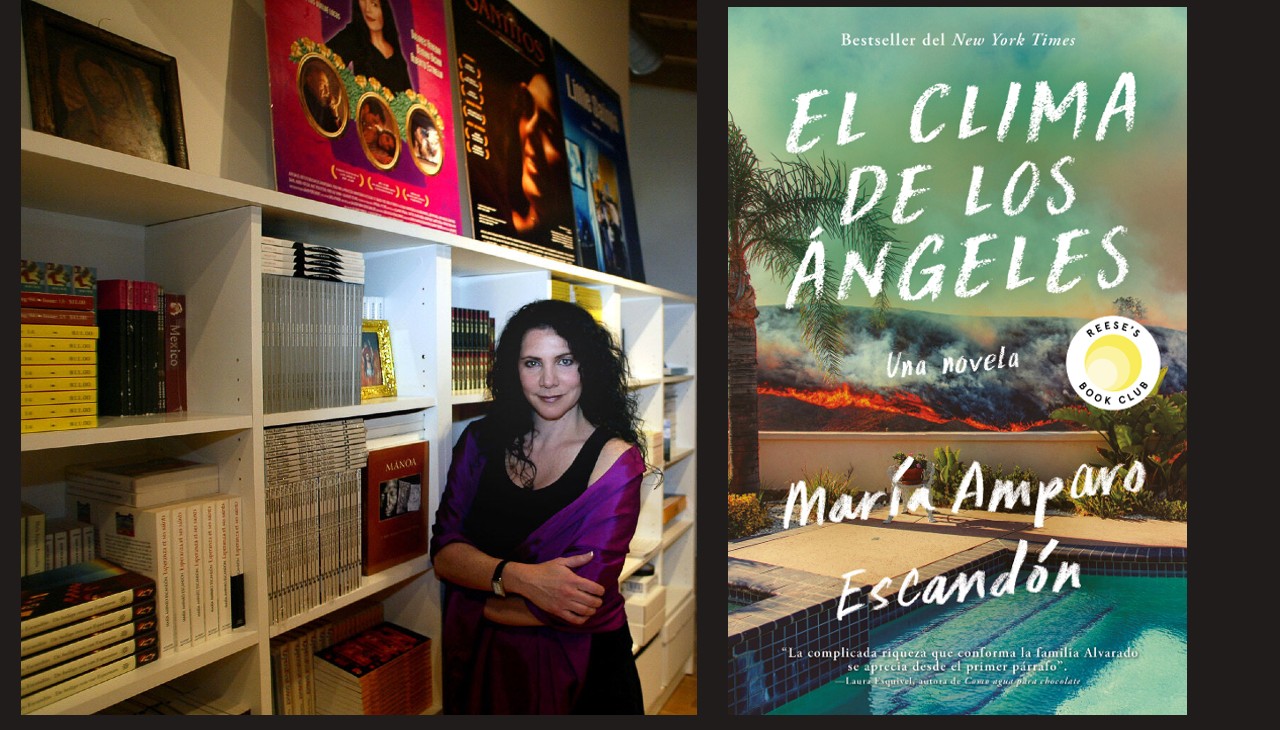
Debunking a Trope
Maria Amparo Escandon's latest novel, ‘L.A. Weather’, depicts a Mexican-American family dealing with droughts, secrets, deceit and betrayal.
While Maria Amparo Escandón was living temporarily in New York City, she came across a few people who said, “There isn’t weather in LA.” Then she
thought about the drought, the fires, the marin domes, the Ridiculously Resilient Ridge, the very real possibility of a catastrophic ArkStorm, El Niño, La Niña, La Nada, and realized she “could debunk a trope”.
“ It’s really not always 72 and sunny in LA”, Escandon explained in a recent interview with AL DIA News. Escandon is the author of L.A Weather, a family novel that drops us into the story of the Alvarados, a wealthy Mexican American family wrestling with impending evacuations, secrets, deception, and betrayal, and their toughest decision yet: whether to stick together or burn it all down. The novel, winner of the Rudolfo Anaya Best Latino Focused Fiction Book Award, 2022, has been recently been published in Spanish as El clima de Los Ángeles (Penguin Random House, 2022).
As Escandón said, the main idea of the novel was to use the weather as a metaphor for the trials and tribulations of an LA based Latinx family over the course of a year in which she put them through every possible crisis: Oscar, the patriarch of the Alvarado family, is obsessed with the weather and just wants a little rain, but in reality, he harbors a secret that distracts him from everything else. His wife, Keila, desperate for a life with more privacy and less Weather Channel, feels she has no choice but to end their marriage. Their three daughters Claudia, a television chef with a hard-hearted attitude; Olivia, a successful architect who suffers from gentrification guilt; and Patricia, a social media wizard who has an uncanny knack for connecting with audiences but not with her lovers are left questioning everything they know. Each will have to take a critical look at her own relationships and make
some tough decisions along the way.
Divorce, climate change, gentrication, the power of social media, loneliness... Your novel touches social issues that deneour cities today. Do they affect Latinos in a different way?
Yes and no. The list of issues fall into different categories. Divorce may be a bit more complex to deal with in a Latinx couple. Family size, beliefs, social pressure, tradition, all affect a couple who is in the process of making a difficult decision all the more difficult.
Loneliness, although in many cases doesn’t have anything to do with how many people you’re surrounded by, is a feeling that Latinos tend to address as a community. Sadly, gentrification affects communities of color more than the white population. Cities grow, real estate becomes more expensive, displacing people in old neighborhoods to the fringes of the urban mass. On the other hand, climate change and the power of social media are is-
sues that affect us all.
You moved from Mexico to L.A four decades ago. How do your old Mexican friends see you? Would you do it again?
RELATED CONTENT
My friends in Mexico (and I have many) know well how much of an amphibian creature I’ve become. They’ve seen me leap back and forth across the border with natural agility. I consider myself, at this stage of my life, fully bicultural. This doesn’t mean that when I’m in Mexico I’m Mexican and when I’m in the United States I’m American. I am both all the time. So, by now, I don’t question if it was a good decision to move to the U.S. because it would question my current identity, which I cherish. So, yes, I’d do it again. No regrets.
Your experience as a Latino is quite different from undocumented Mexican and Latinamerican who cross the border to escape from violence and poverty. However, is there anything in common between you and them?
I’m going to speak for Mexicans, as that is my experience. Everyone is constantly trying to avoid and escape violence. Rich, poor, urban or rural, educated or not, no one is safe. We live looking over our shoulder for danger. Journalists get assassinated. Young countryside kids are forced into drug cartels. Anyone can get kidnapped off the street. The rule of law is non-existent.There is no accountability. I did not grow up in poverty, but I came to Los Angeles penniless.
My wealth was my education. I was fortunate to finish an undergraduate degree as many of other immigrants I’ve met who’ve come to the U.S for a variety of reasons. I think this is is the main difference with some of my co-nationals who have not had the chance to get an education. So, yes, we are all escaping violence, but more important than seeking an escape from poverty, I believe the engine that really drives us to leave it all behind is opportunity.
Your previous novels ( Esperanza’s Box of Saints, González & Daughter Trucking Co) were also written originally in English, then translated into Spanish. What language do you feel more comfortable writing in?
I write in English first. It’s harder for me, but I enjoy the learning process. Then I translate into Spanish for fun. I believe language is a critical medium for the preservation of culture. When we teach our kids Spanish, we are keeping our culture alive. Here’s the mantra I raised my children with: “English is the language of the head. Spanish is the language of the heart.”











LEAVE A COMMENT:
Join the discussion! Leave a comment.